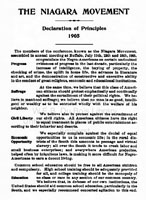

 Du Bois and Clement Morgan, Boston attorney and Harvard classmate of Du Bois, at a Boston meeting of the Niagara Movement in 1907.
Du Bois and Clement Morgan, Boston attorney and Harvard classmate of Du Bois, at a Boston meeting of the Niagara Movement in 1907.
 As a result of the intransigence of Booker T. Washington's "Tuskegee Machine," Du Bois and other black leaders of similar opinions organized what became known as the Niagara Movement. It was the first organization to seek full political and economic rights for Afro-Americans at a national level. By 1910, the organization led to the founding of the NAACP.
As a result of the intransigence of Booker T. Washington's "Tuskegee Machine," Du Bois and other black leaders of similar opinions organized what became known as the Niagara Movement. It was the first organization to seek full political and economic rights for Afro-Americans at a national level. By 1910, the organization led to the founding of the NAACP.
 Niagara Movement Declaration of Principles.
Niagara Movement Declaration of Principles.
 The original 29 members of the Niagara Movement. Missing are G.W. Mitchell, Pa., and E.B. Jourdain, Mass.
The original 29 members of the Niagara Movement. Missing are G.W. Mitchell, Pa., and E.B. Jourdain, Mass.
 |  |
[ An Activist Life ][ Page 1 ][ Page 2 ][ Page 3 ][ Page 4 ][ Page 5 ][ Page 6 ][ Page 7 ][ Page 8 ][ Page 9 ]
[ Page 10 ][ Page 11 ][ Page 12 ][ Page 13 ][ Page 14 ]
[ Du Bois Central ][ SCUA home ]